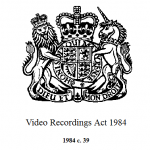Law Weblog
People remain convicted for offences under unenforceable Act
Saturday 30 January 2010 at 2:37 pm | In News | Post Comment The Video Recordings Act 2010, received Royal Assent last Thursday and it has produced a Constitutional Law anomaly.The Video Recordings Act 1984 made it a criminal offence to sell videos, DVDs and video games not in accordance with the correct classification certificate, for example to children or those that should only be sold in licensed sex shops.
However, Parliament enacted the 1984 Act in breach of the Technical Standards Directive, a European Community law that requires that the European Commission be consulted. This breach of EU law made the 1984 Act unenforceable. It is unheard of for an Act of Parliament to be legally unenforceable.
From September prosecutions stopped, and appeals have been unopposed by prosecutors.
Last week Parliament revoked and re-enacted the 1984 Act. The new Act does not have retrospective effect, so those accused of offences last month cannot be prosecuted under the 2010 Act.
What is not known is what will happen to those who were prosecuted and convicted under the 1984 Act and who are out of time to appeal, should their convictions now be revoked as not being in accordance with law?
Courts will not set aside convictions unless there are exceptional circumstances and there has been a substantial injustice. It is almost certain that these events will find a place in all constitutional law textbooks
No Comments yet »
RSS feed for comments on this post. TrackBack URI
Leave a comment
Powered by WordPress with Pool theme design by Borja Fernandez.
Entries and comments feeds.
Valid XHTML and CSS. ^Top^
